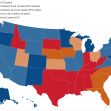The legal US map is getting complicated, and citizens, businesses, insurance companies plus friends and families are all targets for new laws in states with illegal abortion. With almost half of the US states each landing on opposite sides of legal - or illegal - abortions for women residents, numerous legal issues are posed to become lightning rods across the nation.
Simultaneously, laws on the books in states such as Texas include actionable civil lawsuits across state lines for anyone helping a pregnant woman travel to perform a legal abortion in another state.
A fundamental right for all Americans, the Supreme Court agrees that under the 14th Amendment to the US Constitution, the right to travel aka ‘fundamental movement,’ includes everyone, meaning citizens can travel to any state in privacy and with no interference from the government.
However, the sitting Justices just overturned the century-old constitutional right to abortion, so it is a small leap of imagination to envision further restrictions for pregnant women living in anti-abortion states to have restrictions placed upon them.
Can the Supreme Court overturn the right to travel? The short answer is yes.
Millions of American women will now still seek an abortion by traveling to other states where legal abortions can be safely performed.
Complicating matters further are issues of private businesses, many of which have stepped up to cover their employees' travel costs for abortions out of their home state. American firms such as The Walt Disney Company, Apple, Uber, Dick’s Sporting Goods, Lyft, JP Morgan Chase, and many others are now informing employees their costs will be covered if they need to travel from a state where abortion is illegal to one where it is legal.
Many companies across the US that provide medical benefits to their workers in both anti-abortion and pro-abortion states are sticking with their current benefits policies, with a caveat that pregnant women can be reimbursed for traveling for an abortion. Pregnant women across the US would need to rely upon their medical benefits to pay for the procedure.
Additionally, most US companies offer reproductive health benefits that include abortion and travel expenses to access healthcare.
In a letter to employees, Disney stated that its medical benefits will cover costs for any travel for workers for “family planning” who can’t access medical care in their home state, “including pregnancy-related decisions.”
Dick’s Sporting Goods will pay workers $4,000 toward their travel expenses “to the nearest location where that care is legally available” for pregnant women.
Lyft announced it will cover all costs under its medical benefits plan for “elective abortion and reimbursement for travel costs” if any employee needs to travel more than 100 miles for an in-network provider in their home state.
Though the right to travel is still very much legal in the US today, what happens when a pregnant employee crosses state lines from her state, where abortion is illegal, to another state, where it is legal?
The staggering legal challenges between illegal-abortion states and legal-abortion states, as pregnant women may travel between each, are confusing and daunting.
Can a state where it’s illegal to have an abortion prosecute a pregnant woman when she returns home from getting an abortion in a legal state? When abortion is considered illegal, would a woman who had a legal abortion in, for example, New York return home to, for example, Texas, and be arrested and charged with murder, facing jail time or even the death penalty? This legal scenario is unsettled federally, but each state under its own laws may handle abortion differently.
Texas is a primary model for the state’s anti-abortion laws. In Texas, the S.B. 8 law, known as “The Heartbeat Act,” bans almost all abortions and also gives full enforcement responsibility to citizens. Overall, if a physician detects a fetal heartbeat, abortion is illegal. The only legal exception is for a medical emergency.
Anyone who assists a woman to get an abortion can be sued. For both private citizens and major companies noted above, that offer to reimburse pregnant women for abortions, this is troublesome. In this section of the law quoted below, note the usage of the word “intent” for legal implications.
Section 171.208 of S.B. 8, civil violation, states, “Any person, other than an officer or employee of a state or local governmental entity in this state, may bring a civil action against any person who: (1) performs or induces an abortion in violation of this subchapter; (2) knowingly engages in conduct that aids or abets the performance or inducement of an abortion, including paying for or reimbursing the costs of an abortion through insurance or otherwise, if the abortion is performed or induced in violation of this subchapter, regardless of whether the person knew or should have known that the abortion would be performed or induced in violation of this subchapter; or (3) intends to engage in the conduct described by Subdivision (1) or (2).”
Texas law allows the government to sue clinics; staff at clinics, including doctors, nurses, receptionists; family members; friends, and strangers who pay for an abortion. Anyone who raises funds for abortions, donates to such funds, and insurers that approve a claim for abortion are also considered participating in illegal actions and will be sued.
Ride-share companies such as Uber or Lyft that drive a pregnant woman to an abortion clinic, which may occur for an out-of-state ride, will be sued. This section of the law in particular negates a women’s right to travel.
Anyone who shares any information about a woman’s abortion choices or even medical information will be sued. In this section of the law, the constitutional right to freedom of the press is revoked in Texas.
As per intent, if any citizen knows someone is planning an abortion, whether or not the procedure occurs, that citizen will be sued.
Can these laws impact other states, where abortion is legal?
Section 171.210 states, "A civil action brought under Section 171.208 shall be brought in: the county in which all or a substantial part of the events or omissions giving rise to the claim occurred; the county of residence for any one of the natural person defendants at the time the cause of action accrued; the county of the principal office in this state of any one of the defendants that is not a natural person; or the county of residence for the claimant if the claimant is a natural person residing in this state.”
In this section of the Texas S.B. 8 law, the language states anyone from any state can sue someone if they help a Texan get an abortion, anywhere. Furthermore, the language makes it possible for people in other states to be sued for helping any Texan women get an abortion.
Legally, anyone helping a Texan get a legal abortion in their state can claim that Texas has zero jurisdiction over them. However, since this law has no legal geographic boundaries, Texans may still discover ways to sue anyone living in any state. Thus, a New Yorker may be sued, potentially at this time, for helping a pregnant Texas woman get an abortion in a state where it’s legal.
S.B. 8 also turns American law on its head, since the entire burden of proof is on the defendant and not the plaintiff. The proof in this new law is not for the plaintiffs to prove laws were broken, but instead, on the defendants, who must offer what the law calls “a preponderance of evidence” proving they are innocent.
Notably, the burden is on defendants to prove they did not break the law, not on the plaintiffs to prove that the law was broken — the opposite of normal legal practice.
Lastly, there is a large financial reward for plaintiffs who win in court against any of the offenders noted above: $10,000. And the defendants will have to pay for the plaintiff’s court costs.






